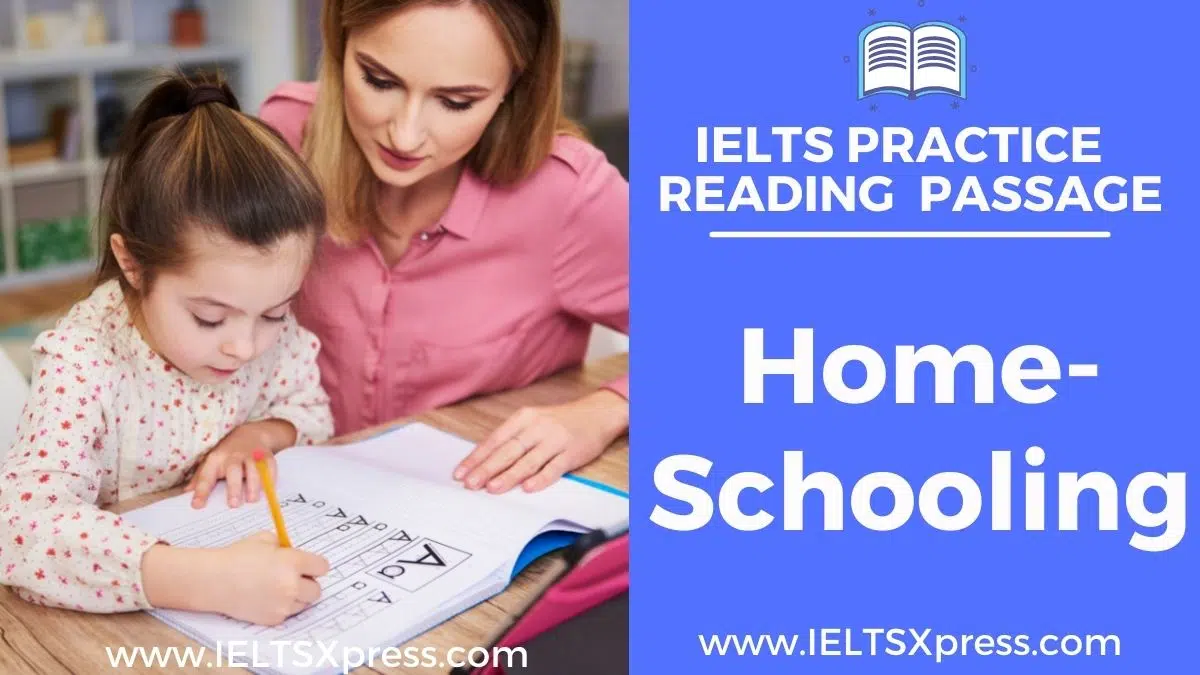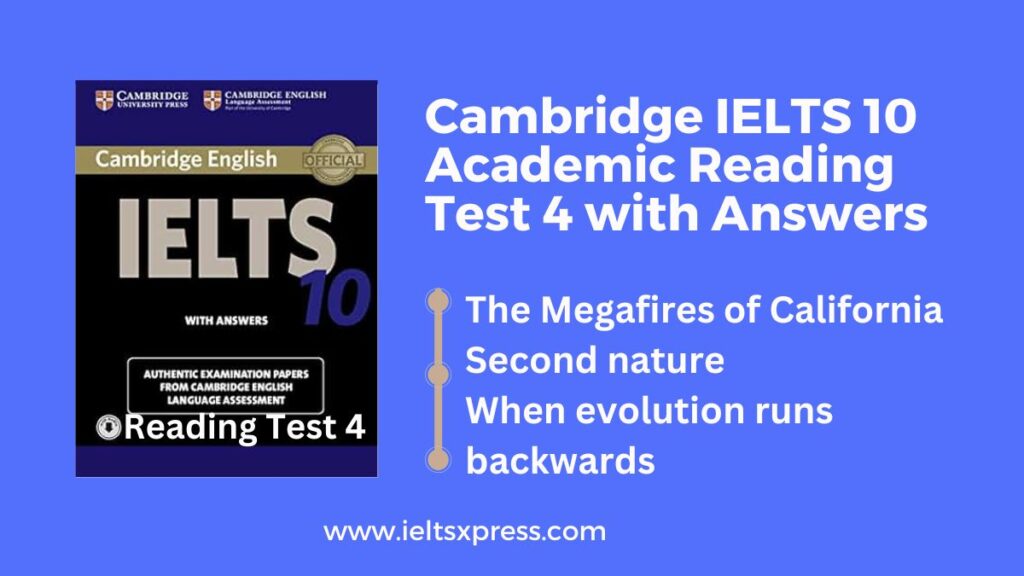Homeschooling IELTS Reading Passage with Answers
Reading Passage 3
You should spend about 20 minutes on Questions 27-40 which are based on Reading Passage 3 below.
Homeschooling
Paragraph A
Homeschooling is a method of education where children do not attend a traditional school. Instead, usually parents take over the responsibility for the education of their children, either doing it all themselves or by using a company that specialises in providing homeschooling curricula and materials. Homeschooled children can excel in standardised testing and universities and colleges have no qualms about accepting them. Supporters also claim that because they have been trained early on to be independent learners, homeschooled individuals grow up to become reliable, resourceful individuals.
Paragraph B
Homeschooling offers various benefits. Almost all homeschooling families say that homeschooling has played an essential role in bringing their family closer, as the time that parents spend teaching their children, and the time the children spend learning together, can foster a loving relationship in the family. Homeschooled children do not have to worry about bullying, peer pressure and spiteful competition, so their self-esteem does not have to suffer needlessly, and many parents with children who have been the target of bullying have resorted to homeschooling to protect their children from the harmful effects of harassment. Another key advantage of homeschooling is that parents and children no longer have to work their lives around homework and school hours. They usually accomplish in a few hours each day what typically takes a week or more to complete in a classroom setting. Because they spend more time in hands-on learning, homeschooled children can do away with homework, which is what usually keeps public schooled children up late at night. Additionally, families can schedule offseason vacations, go on field trips or visit museums, zoos and parks during the week as part of their learning experience. A more controversial benefit of homeschooling is that parents have frequently much more say in what is taught to their children, so that they can avoid subjects which they disapprove of.
Paragraph C
Homeschooling is, however, sharply criticised in some quarters. A common criticism is that homeschooled children may not have as many opportunities to interact with other children in comparison to children who attend regular schools. Forming bonds and socialising with children his or her own age is important for a child’s developmental health and development of social skills. If homeschooled, children may be deprived of the chance to form friendships and may suffer socially. The lack of socialisation may affect them in later stages of life.
Paragraph D
Parents choosing to homeschool their children may also be faced with the common problem of time. Parents need to set aside time to make it work. The task of homeschooling a child is certainly not easy, whether for working parents, single parents or stay-at-home parents. They have to take time to organise and prepare lessons, teach, give tests, and plan field trips. Also, in comparison to public schools, where education is free, homeschooling can also be costly, as purchasing the newest curriculum and teaching tools can be very expensive. Parents may choose to use a pre-prepared paid homeschooling program, but, in spite of the possible added benefits of such programs, they may increase the cost of the child’s education. There are also other costs to keep in mind, like project materials, stationery, books, computer software, and field trips.
Paragraph E
There is also the issue of the different relationships between parents and their children and teachers and their students. Public and private schools provide for many children a safe haven, in which they are both regarded and respected independently and individually. Family love is intense, and children need it to survive and thrive. It is also deeply contingent on the existence and nature of the family ties. The unconditional love children receive at home is actually anything but unconditional: it is conditioned on the fact that they are their parents’ children. School, either public or private, ideally provides a welcome respite. Children are regarded and respected at school not because they are their parents’ children, but because they are students. They are valued for traits and for status that are independent of their status as the parents’ genetic or adoptive offspring. The ideal teacher cares about a child as an individual, a learner and an actively curious person. The teacher does not care about the child because the child is his or hers, and the child is regarded with respect equal to all the children in the class. In these ways, the school classroom, ideally, and the relations within it, is a model of some core aspects of citizenship.
Paragraph F
A final criticism of homeschooling is that there is a public health risk. Children who attend public schools are required to have immunisations in order to begin classes. It is hard in many countries to ensure that mandatory immunisation is verified. Thus, deregulated homeschooling means that homeschooled children are basically exempted from immunisation requirements. The children are more susceptible to the diseases against which immunisation gives some protection, and others around them, particularly the elderly, are also consequently in danger.
Paragraph G
Even given these potential harms, there remain good reasons to permit homeschooling in plenty of circumstances. Parents often justifiably wish to shield their children from public schools that too often ill serve children who are at risk of bullying, or who are hurt by the culture of middle and high schools. Some children also have special abilities or needs, or simply idiosyncratic learning styles or habits, and many of these children can best or even only be educated by those who know them best.
Questions 27-33
The text on the previous pages has 7 paragraphs A – G.
Which paragraph contains the following information?
Write your answers in boxes 27-33 on your answer sheet.
27 The traditional school environment can sometimes be a good model for living in today’s society.
28 Homeschooling has been accused of hindering children’s social development.
29 Homeschooling can sometimes better adapt to a child’s special learning needs.
30 There are companies that focus on providing homeschooling materials, guidance and curricula.
31 Homeschooling can be a financial burden for some families.
32 Homeschooling has been accused of spreading disease.
33 Homeschooling families can benefit from cheaper holidays outside the peak seasons of regular school holiday times.
Questions 34-37
Choose the correct letter A, B, C or D.
Write the correct letter in boxes 34-37 on your answer sheet.
34 Homeschooled children will often
A have no problem entering university.
B have difficulties with universities accepting them.
C have to attend universities that offer similar teaching styles to the children’s childhood education experiences.
D not need to attend university.
35 Homeschooled children can
A often become bullies when they meet other children.
B be bullied more often.
C be bullied less often.
D be often subject to a special type of parental bullying.
36 Homeschooling classes
A generally take up more time than those at traditional schools.
B take up more or less the same time as those at traditional schools.
C generally take up a lot less time than those at traditional schools.
D generally take place in the mornings.
37 Homeschooling parents can often choose not to
A make their children sit exams.
B study certain subjects they do not favour.
C have any holidays away from education.
D share their children’s results with universities.
Questions 38-40
Do the following statements agree with the views of the writer of the text?
In boxes 38-40 on your answer sheet write:
YES if the statement agrees with the writer’s views
NO if the statement doesn’t agree with the writer’s views
NOT GIVEN if it is impossible to say what the writer thinks about this
38 Many parents are challenged by the parental time required of them to homeschool their children.
39 Parents’ love for their children is unconditional.
40 US law should require that parents who choose homeschooling are inspected at least once a year.
Homeschooling IELTS Reading Passage Answers
Practice with Expert IELTS Tutors Online
Apply Code "IELTSXPRESS20" To Get 20% off on IELTS Mock Test
27. E
28. C
29. G
30. A
31. D
32. F
33. B
34. A
35. C
36. C
37. B
38. YES
39. NO
40. NOT GIVEN
Also Check: The Life of Sir Isaac Newton IELTS Reading Passage




